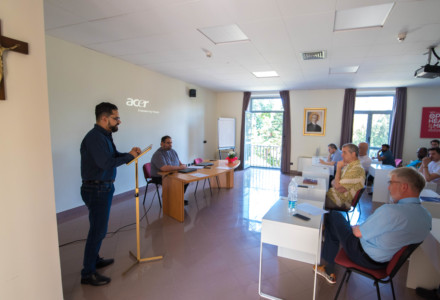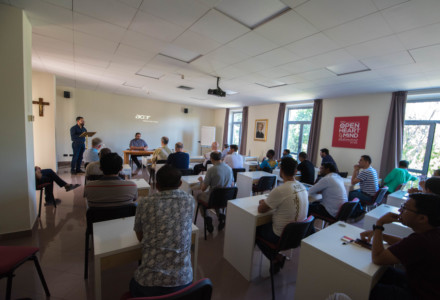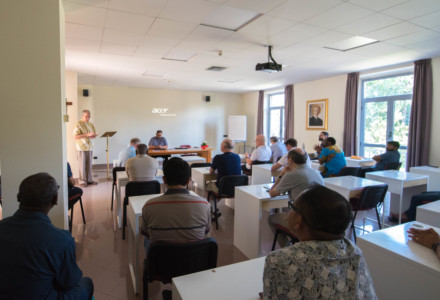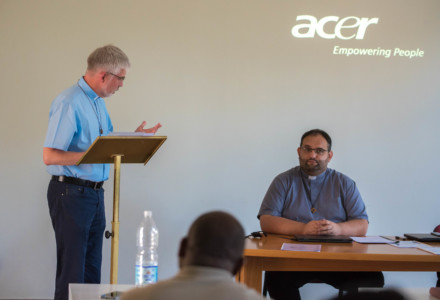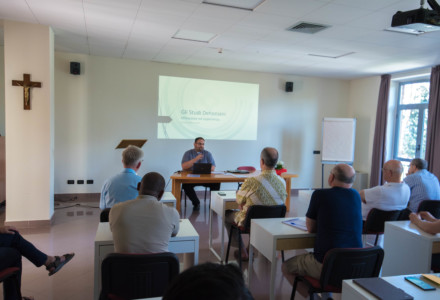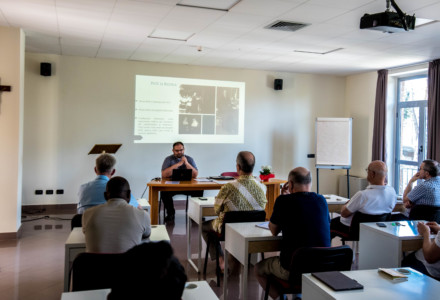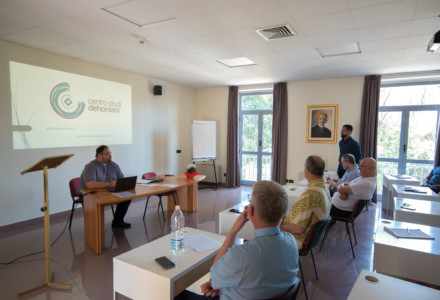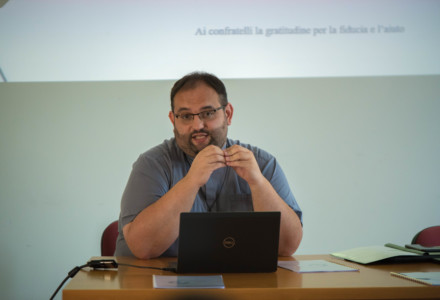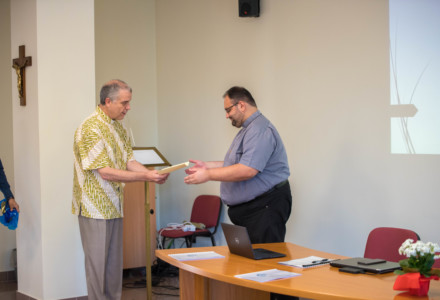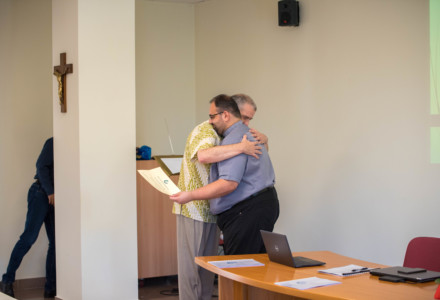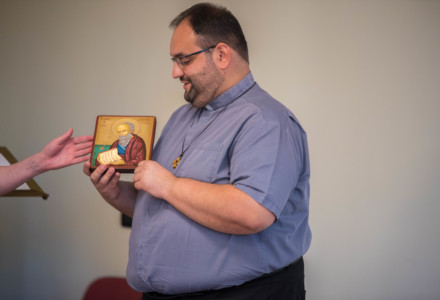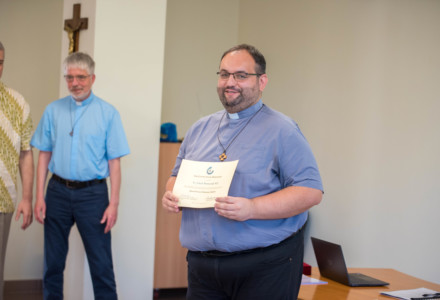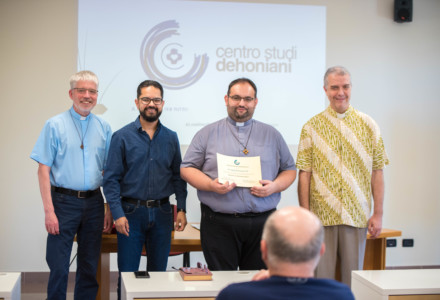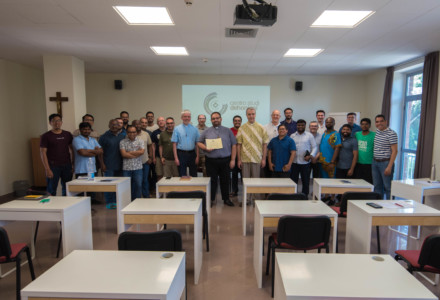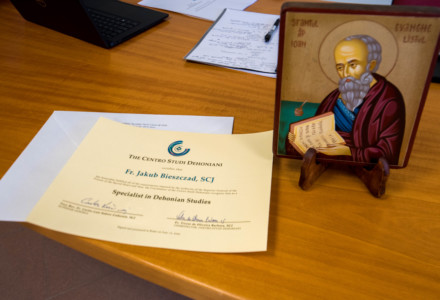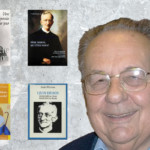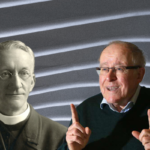Interview with Fr. Jakub Bieszczad at the conclusion of Dehonian Studies, at the Center for Dehonian Studies (CSD): status of Dehonian research today, evaluation and perspectives.
On June 18, 2022 at the Generalate in Rome, Fr. Jakub Bieszczad SCJ of the Polish Province concluded the course of the Dehonian Studies Fellowship (BSD) program sponsored by the Centro Studi Dehoniani (CSD). After 5 years of studies (2017-2022), including academic studies of baccalaureate and licentiate in Church History at the Pontifical Gregorian University, and practical experiences in the CSD, Fr. Jakub presented to the General Government and the community of the Generalate a summary of his educational journey and his vision of Dehonian Studies.
The presentation was introduced by Fr. Stefan Tertünte SCJ, who has followed Fr. Jakub these past five years. At the end of the meeting, Superior General Fr. Carlos Luis Suárez Codorniú, SCJ presented Fr. Jakub with the certificate of “Specialist in Dehonian Studies.” We interviewed Fr. Jakub, with the aim of capturing some elements of his research journey.
Father Jakub, what have been your main formative experiences over the years and what skills do you feel you have acquired?
In summary, I can say that the training developed on two fronts: personal research and introduction to scholarly work. Beyond licentiate in Church History, personal research led me to reading Dehon and related literature. The various seminars held weekly or fortnightly allowed me to discuss what I assumed in reading the texts. The internship at the Center for Dehonian Studies, took place in various aspects. Part of my work was editorial, related to the dehondocs.org website. I collaborated in the publication of Dehonian correspondence.
About 20 years ago, the archives of the Congregation of the Doctrine of the Faith opened for scholars: for this reason, I was entrusted with the reworking of the Holy Office fund. Fr. Stefan Tertünte extracted from this location the documents concerning Fr. Dehon. My work consisted of reading, transcribing and cataloguing the fund. In the final document, I also try to identify themes for future research. In addition to the practical internship, I attended the meetings of the Dehonian International Theological Commission (CTID). Among the many collateral commitments I have undertaken, I mention the following: preparation for perpetual profession and the formation of leaders of the Dehonian youth movement (charismatic part), both for the Polish province; two workshops for the new edition of the Dehonian Fellowship, one on nineteenth-century France and the other concerning the above-mentioned Holy Office fund.
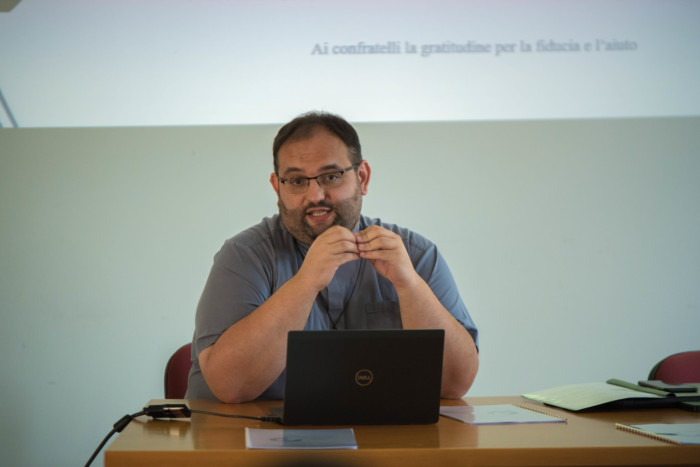
What is your assessment of the current status of Dehonian studies and from your point of view what is the most appropriate methodology in developing research in the Dehonian field?
In my opinion, the nature of Dehonian studies, because of its epistemological status, is in continuous development. It is not the knowledge of Fr. Dehon and his work, but the search for the Dehonian ethos, drawn from the experience of our charismatic tradition and actualized in our particular context. As such, the ethos must be considered in three dimensions. The first one is historical, because we are dealing with the religious experience of a personality who passed away almost 100 years ago; thus, we must use the historical method to understand how this ethos arose and manifested itself in Dehon’s life and in the history of the institute and how it is still relevant today. Our ethos (in theological language, we might say charism) has also two others dimensions: spiritual and social. Therefore, at the methodological level it is necessary to make use of both theological and sociological disciplines. Methodologically, in each dimension, the ethos must be described theoretically to determine the essential and contingent elements, but it must also become the object of practical reflection to find ways of its implementation.
What might be the research areas and prospects for Dehonian studies in the coming years?
Dehonian reflection is essentially interdisciplinary and multi-methodological. Obviously, each era brings with it questions and needs, but my approach is integral (to remain in the good school of the Founder) and, consequently, opposes the dominance of one discipline that holds back reflection in other areas. For me, all three dimensions-historical, spiritual and social-will never lose their relevance and necessity, despite the fashions and accents of each time. The key issue today, given the strong insistence of the last General Conference on the Dehonian Social Method, is that this dimension of studies remains somewhat at the margin of qualified reflection in the congregation.
I identify as a challenge the broadening of the vision of Dehonian studies, adding a typically sociological field, directed not only to the observation of social phenomena rather to a critical dialogue. Indeed, the challenge is to prepare scholars so that they can carry out such research in the Dehonian spirit. The other challenge always remains that of a network of Dehonian thought, also postulated by the last General Conference. The question is how to extend Dehonian studies beyond the central structure (CSD), preserving the concept of centers distinct from the Dehonian Theological Commissions. For me, the possible way forward must foster autonomy of research, linkage with sources and clarity of purpose in the different structures of the Congregation.


